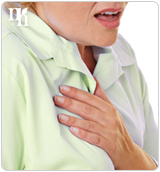
You may not realize it, but your body needs testosterone just as much as a man does. Although the male body produces about 20 times more testosterone than that of a female, it remains a vital hormone in your body. Testosterone helps to regulate lots of your body's functions and keeps you looking youthful by helping to maintain your muscle tone. During menopause, your testosterone levels can drop, causing menopause symptoms. Read on to learn how low levels of testosterone could be affecting you.
Testosterone Levels during Menopause
During menopause, your hormones levels can fluctuate wildly. Testosterone is one hormone that can be affected during this stage of life. If your testosterone levels drop during menopause, it can result in symptoms including reduced libido, short term memory loss, and osteoporosis. These symptoms can have a dramatic affect on your life and could even be debilitating. You may be able to combat these symptoms by boosting your levels of testosterone. This can be done through hormone replacement therapy (HRT). However, receiving testosterone through HRT comes with its own risks and side effects. Read on to learn more about HRT.
Testosterone: The Perils Thereof

A patient receiving testosterone through HRT may get their dosage of the hormone via a number of different channels. Testosterone can be administered through patches, gels, injections, or pellets. However, studies have shown that older women receiving testosterone can have an increased potential of developing heart disease. You may also develop some male characteristics like increased amounts of body hair, male pattern baldness, and a deeper voice.
The risks involved with receiving testosterone mean that it should only be considered as a last resort after all other alternatives have been thoroughly investigated. Read on to learn about the alternatives to taking testosterone through HRT treatments.
Safe Alternatives to HRT Treatments
The risks involved with taking testosterone by way of HRT can outweigh the potential benefits, but don't despair. There are alternatives that may help to relieve your menopause symptoms.You should consider making some lifestyle changes, such as exercising more and trying to maintain a healthy diet. By leading a healthier lifestyle you may become less affected by your menopause symptoms.
You may also find that herbal remedies help. Try using adaptogenic herbs like ginseng or ginkgo biloba. Adaptogenic herbs help to increase the body's resistance against stress, trauma, anxiety, and fatigue. Treatments like these can help reduce your susceptibility to succumbing to the effects of menopause symptoms.
Click on the following link to learn about other herbs that may help to combat your symptoms of menopause.

